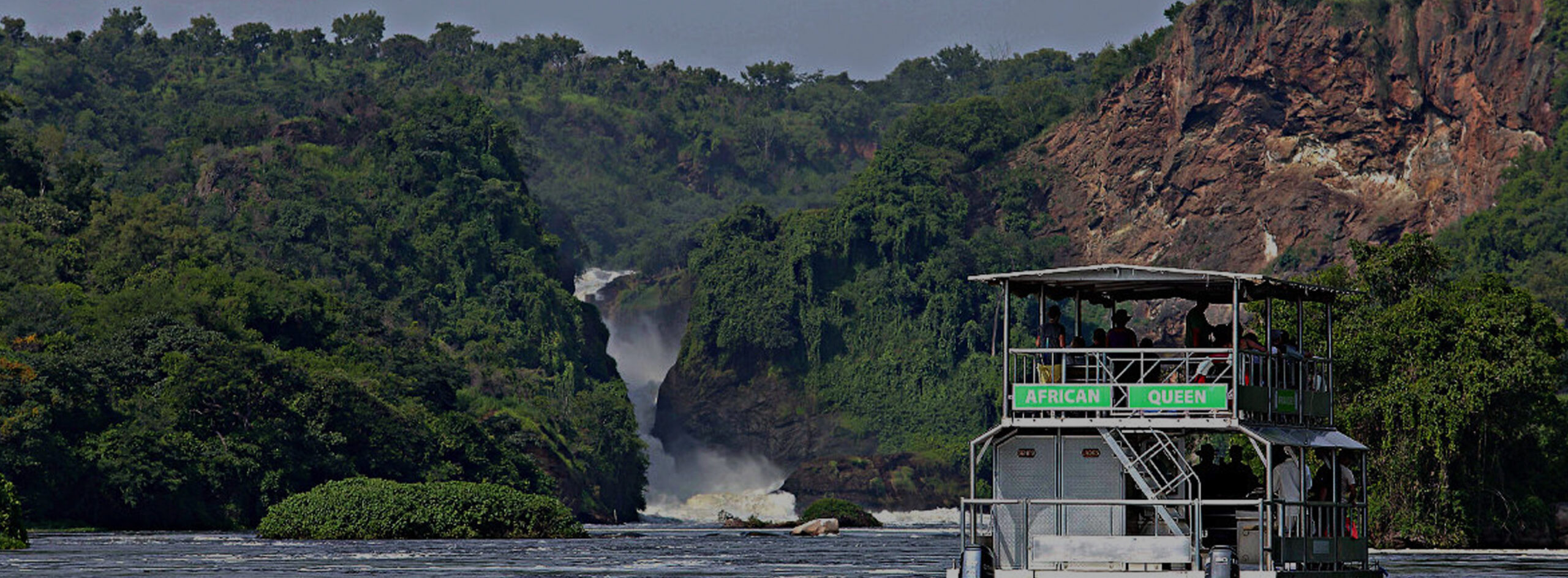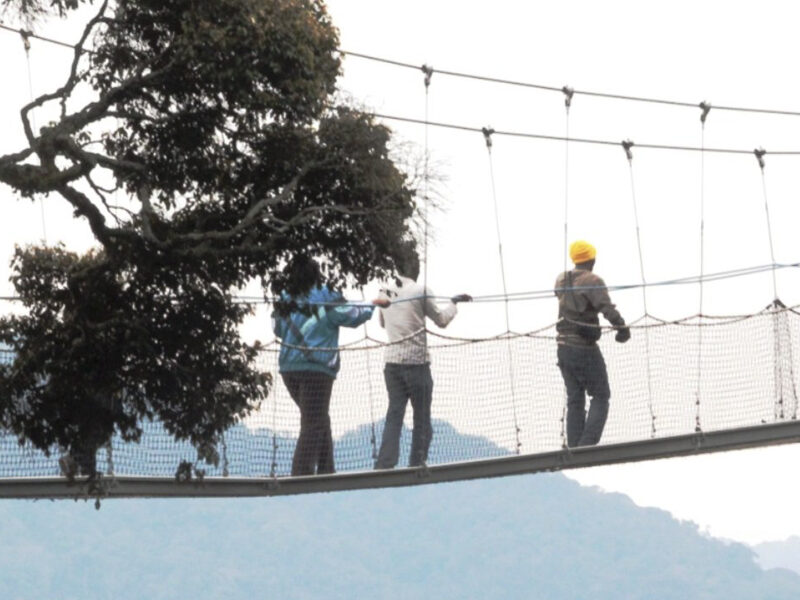16 Days Uganda Ecotourism Tour
5000$
per personThis 16-day ecotourism safari allows visitors to see the gorillas of Bwindi and probably track a second time in Mgahinga, Nkuringo, Ishongi (in Bwindi South) or even in Congo nearby . See the chimpanzees in Kyambura Gorge and Kibale Forest and participate in the Chimpanzee habituation Experience. Also see birds Kibale, Budongo, Kyambura, Bwindi and QE Parks – everywhere on this trip! Tour ends with Lake Mburo Park and a visit to the Source of the River Nile in Jinja
Uganda is well known for its immaculate attractions. This trip allows you a chance to enjoy these pulls. Some five parks, in the Western section of the country, are selected for a comprehensive exploration.
The safari starts with Kibale Forest National Park in the West, continuing to Queen Elizabeth Park, and then on to Bwindi and Mgahinga Gorilla parks all World Heritage Sites. Kibale Forest has the highest number of primates in Africa – thirteen species in all, including red, black and white colobus, blue monkeys, baboons and a large number of chimpanzees.
A forest walk and Habituation Experience provides a high possibility of seeing and hearing the vast number of chimps and other primates playing and jumping around through the forest. With over 300 bird species recorded in the forest, Kibale boasts of many rewarding experiences not thought of in some other forests of the world. An excursion to Bigodi and Magombe wetlands gives the opportunity of seeing the unusual birds, chimps, baboons, monkeys and other primates which live around the swamp.
See abundant game in Queen Elizabeth park including buffalo, tree-climbing lion, leopard, warthog and the ever present hippo. Birds are everywhere on the kazinga water channel, in Kyambura and Maramagambo forests, on game tracks! The beautiful steeply forested Kyambura Gorge is home not only to chimpanzees but also the red-tailed monkey, black and white colobus and many bird species. Around Ishasha go on the hunt for the famous tree-climbing lions which lounge nonchalantly on old fig trees.
Further south in Bwindi go gorilla tracking and see other primates, birds and butterflies before continuing to Mgahinga, which is part of the Virunga Conservation Area, for gorillas and breathtaking volcanoes. Track gorillas again or climb a volcano, go birding, take in the breathtaking landscape or visit local Batwa animist communities.
Return to Kampala via Lake Mburo, one of Uganda’s most striking parks rich in birds, hippo, buffalo, zebra. Visitors are briefed on conservation by four different park officials/wardens. They stay in well- selected environmentally friendly Camps and lodges.
-
DepartureTour startTour starts from: “Entebbe” at 10:00 a.m. every Saturdays from: Kampala, Entebbe, Uganda
-
Departure TimePlease arrive by 9:15 AM for a prompt departure at 9:30 AM.
-
Return TimeApproximately 8:30 PM.
-
Dress CodeCasual. Comfortable athletic clothing, hiking shoes, hat, light jacket.
-
Include
Day 1: Arrival
Day 2: Kampala to Kibale Forest
Day 3: Chimpanzee tracking
Day 4: Forest walk
Day 5: Kibale Forest to Queen Elizabeth Park
Day 6: In Queen Elizabeth Park
Day 7: In Queen Elizabeth Park
Day 8: Queen Elizabeth Park to Bwindi Gorilla Park
Day 9: Gorilla tracking
Day 10: Buhoma Village Tourist Walk
Day 11: Bwindi to Mgahinga National Park
Day 12: Second gorilla tracking
Day 13: To Lake Mburo
Day 14: Lake Mburo to Kampala
Day 15: Jinja and The Source of the River Nile
Day 16: Kampala City tour
Tour Location
On this tour, you will see Nakayima tree shrine, Omukama’s Royal Palace in Tooro, the hotsprings and crater lakes in Fort Portal, staragmites and staractites in Kibale, game, birds and chimps in Queen Elizabeth park, Buhoma village walk and gorillas in Bwindi, game and launch cruise on Lake Mburo, the batwa pygmies, before returning to Kampala for the Kabaka’s Trail and a visit to the Source of the River Nile.
-
Uganda's history is marked by pre-colonial kingdoms, British colonial rule, and post-independence challenges. The country's borders were drawn arbitrarily in the late 19th century, encompassing diverse societies. In 1894, Uganda became a British protectorate, and it gained independence on October 9, 1962. Following independence, Uganda faced a period of political instability, including civil wars and military coups.Pre-Colonial Period:
- Uganda's early history is characterized by the movement of various groups of cultivators and herders, leading to diverse languages and cultures.
- The region was home to a variety of centralized kingdoms, including Buganda, Bunyoro, and others, as well as more decentralized Nilotic and Sudanic peoples.
- Evidence of human activity in Uganda dates back to at least 50,000 years ago, with Acheulean tools found along the Kagera River valley.
British Colonial Period (1894-1962):- In 1894, Uganda was declared a British protectorate.
- The British administration extended control beyond Buganda by signing treaties with other kingdoms like Toro, Ankole, and Bunyoro.
- Uganda was never fully colonized; instead, it developed a system of internal self-government through a Legislative and Executive Council.
- The British influence was strong in the late 19th century, particularly with the arrival of missionaries from the British Missionary Society and the French Roman Catholic White Fathers.
Independence and Post-Colonial Period (1962-Present):- Uganda gained independence on October 9, 1962, with Milton Obote as the first Prime Minister.
- The newly independent nation faced challenges, including civil wars and political instability, leading to a period of military coups and dictatorships.
- In 1995, a new constitution was adopted, establishing a non-party all-inclusive Movement System of government.
- In 2005, a referendum was held, resulting in a return to multi-party politics.
- Uganda has since made significant strides in restoring peace and rebuilding infrastructure, while also engaging in peacekeeping operations through the Uganda People's Defence Force.
Key Events and Figures:- Milton Obote: The first Prime Minister of Uganda, who played a key role in the independence movement and later served as President.
- Idi Amin: A military leader who seized power in 1971 and ruled Uganda for eight years, a period marked by human rights abuses and political instability.
- Yoweri Museveni: The current President of Uganda, who has been in power since 1986.
- Uganda's early history is characterized by the movement of various groups of cultivators and herders, leading to diverse languages and cultures.
Write a Review
Boma Guest House in Entebbe or Hotel Africana or Bougainviller Hotel in Kampala Chimpanzee Forest Guesthouse Buffalo Safari Lodge/Mweya Lodge/Jacana Lodge Buhoma Homestead/Gorilla Resort/Bwindi Engagi Lodge Mutanda Lake Resort – Standard Rooms Arcadia Lodge/Mihingo Lodge Forest Cottages / Cassia Lodge








